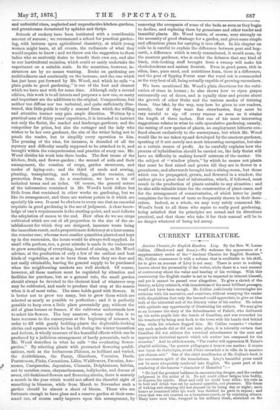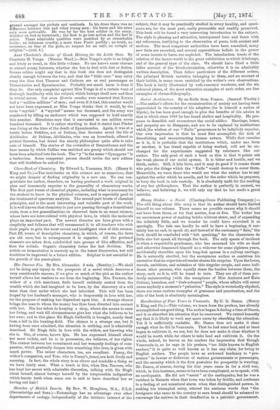CURRENT LITERATURE.
Ancient Classics for English Readers. Levy. By the Rev. W. Lucas Collins. (Blackwood and Sons.)—We welcome the appearance of a supplementary series of the "Ancient Classics for English Readers.' Mr. Collins commences it with a volume that is creditable to his skill, for to give an account of Livy is not easy. There is next to nothing known about the personality of the writer, while there is a vast amount of controversy about the value and bearing of his writings. With this controversy the English reader is not to be expected to interest himself, and yet it cannot be passed over altogether. To give a sketch of the history, as Livy relates it, with translations of the most brilliant passages, would not have been enough. Mr. Collins judiciously intermingles his criticism with his narrative, and contrives, without wearying the reader' with disquisitions that only the learned could appreciate, to give an ides both of the historical and of the literary value of his author. He seizes with aptitude any opportunity of illustrating his subject. We may give as an instance the story of the Schoolmaster of Falerii, who delivered up his noble pupils into the hands of Camillus, and was rewarded for his treachery by being sent back to the town with his hands tied behind him, while his scholars flogged him. Mr. Collins remarks "whether any such episode did or did not take place, it is tolerably certain that Camillus did not address the wretched schoolmaster in the neat and appropriate rhetorical speech which oiir author has composed for the occasion." And he adds in a note, "The reader will appreciate M. Taine's playful criticism, 'Le pauvre pedagogue a trouve son maitre: il ecoute nue leg= de rhetorique, avant d'être recondnit e. la villa de la maniere qua chacun salt." One of the chief excellencies of Mr. Collins's book is the uncommon spirit of the translations. Livy's beautiful prose could not be more adequately rendered into English, We quote part of his rendering of the famous "character of Hannibal ":— " He had the greatest boldness in encountering danger, and the coolest judgment in the midst of it. No toil could either fatigue him bodily, or depress his spirits. Heat and cold he could bear alike; his rule as to food and drink was set by natural appetite, not pleasure. His times of waking and sleeping did not depend on its being day or night; such hours as remained after his work was finished he gave to repose: and even that was not courted on a luxurious conch, or by enjoining silence. Many have seen him, wrapped in his military cloak, stretched on the
ground amongst the pickets and sentinels. In his dress there was no difference between him and other young men : his horse and his arms only were noticeable. Be was by far the best soldier in the army, whether on foot or horseback ; the first to go into action and the last to retire. These admirable qualities were matched by as remarkable faults : an inhuman cruelty, a more than Punic perfidy ; no truth, no reverence, no fear of the gods, no respect for an oath, no scruple of religion."—(xxi. 4.)































 Previous page
Previous page